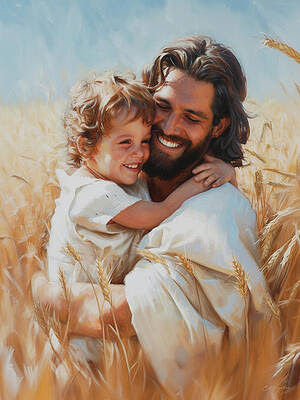The
more I learn about the Saviour, the more amazed I become. This is what amazes
me the most. It is His greatness that began long before His astounding power to
withstand the crucible of the cross.
Consider
the beginning…. When He appeared to Abraham, the pre-mortal Saviour introduced
himself thus: “I am the Lord thy God; I dwell in heaven; the earth is my
footstool; I stretch my hand over the sea and it obeys my voice; I cause the
wind and the fire to be my chariot; I say to the mountains – Depart hence – and
behold, they are taken away by a whirlwind……My name is Jehovah… (Abraham 2:7,8).
As
Abraham was shown ‘the intelligences that were organised before the world was’,
he saw many of the ‘noble and great ones’ and was told that he was one of them
(Abraham 3:22,23). Once again, the Saviour affirmed who He was: “I am the Lord
thy God, I am more intelligent than they all…my wisdom excelleth them all, for
I rule in the heavens above, and in the earth beneath, in all wisdom and
prudence, over all the intelligences thine eyes have seen from the beginning….”
(Abraham 3:19,21)
We
read the interaction between Enoch and God along the same lines. After showing
him all the workmanship of His hands, He declares Himself to Enoch in the most
powerful manner: “I am Messiah the King of Zion, the Rock of Heaven…” (Moses
7:53).
The
perfection level of His obedience in pre-mortal life is astounding. It is
through this obedience He gained the power to rise to the Godhead where He
could create worlds without number (Moses 1:33). Is it any wonder He could
endure this:
“This
sacrifice…took place in Gethsemane when He sweat great gouts of blood from
every pore….And it also took place as He hung on the cruel cross of Calvary.
During the last three hours of that agonising ordeal, while darkness overspread
the land, all the pains and suffering of Gethsemane returned.” (Bruce R. McConkie, “A New Witness for the
Articles of Faith”, p 109)
My
point is this. The Saviour of this world was the firstborn of the Father. He
was the perfect Son and therefore the perfect Brother. The Exampler who paved
the way to obedience, who lifted us to heights we could not reach on our own
even back then. He was the Shepherd long before we became the sheep, the
Shepherd we followed and believed and chose to be our God. We became great in our pre-existent state
because of the perfect example we followed. The influence He has over us now
would have been double-fold back then when we were in His presence.
I
testify of this because I was told once during a prayer: “My Atonement is my
gift to you because you were so valiant in your testimony of Me long before you
were born.” You, me, Abraham……..(D&C
138:11-24).
How can I contain the magnitude of You
In the meagre chambers of my heart?
How can I absorb the brightness
Of Your light that outshines the rays
Of the brightest sun?
How can I explain the lightness of my
being
When You lift me up on wings of faith
Making real the wonder of You?
My love knows no limits
My honour of You, no bounds;
My needy reach for heaven’s door,
To concede, without You,
I am in spirit forever poor.











